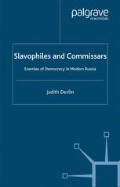Abstract
After the defeat of Zyuganov and his popular-patriotic bloc in the Presidential elections in 1996, was left- and right-wing nationalism henceforth to be discounted as a factor in Russian politics and culture? Was its appeal within the intelligentsia, which had furnished Yeltsin’s radical opponents with the arsenal of nationalist and authoritarian ideas with which to attack him, to be dismissed as a curiosity of no cultural significance? Was the rise of collectivist and authoritarian nationalism after 1991 merely a temporary phenomenon, provoked by economic and social crisis and unrelated to the long-term preferences of the Russian people, or did it reflect a growing and profound public alienation from democratic and liberal ideals?
Access this chapter
Tax calculation will be finalised at checkout
Purchases are for personal use only
Preview
Unable to display preview. Download preview PDF.
Author information
Authors and Affiliations
Copyright information
© 1999 Judith Devlin
About this chapter
Cite this chapter
Devlin, J. (1999). Conclusion. In: Slavophiles and Commissars. Palgrave Macmillan, London. https://doi.org/10.1057/9780333983201_9
Download citation
DOI: https://doi.org/10.1057/9780333983201_9
Publisher Name: Palgrave Macmillan, London
Print ISBN: 978-1-349-40232-8
Online ISBN: 978-0-333-98320-1
eBook Packages: Palgrave Political & Intern. Studies CollectionPolitical Science and International Studies (R0)

